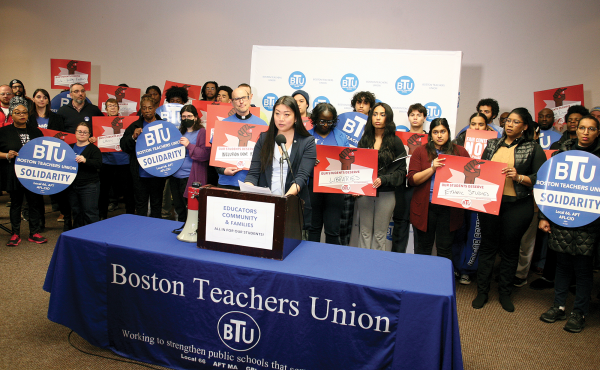March 6, 2024

BTU President Jessica Tang kicked off negotiations on a new teacher contract with a press conference at the union’s Dorchester hall on Thursday by noting four priorities that union members are asking for. Seth Daniel photo
The Boston Teacher’s Union (BTU) kicked off a new round of contract negotiations on Feb. 29 with a press conference at its Dorchester headquarters, where leaders spelled out four major priorities the union says it will be calling for in any new contract.
With six months left on the existing contract, BTU members say they have agreed on their priorities, which they highlighted in a partnership with the Greater Boston Interfaith Organization.
BTU President Jessica Tang said that over the last year the union has conducted conversations with thousands of educators, families, and community members to identify key issues they “want to take to the bargaining table.”
“We are committed to working with the district to ensure that all our educators, students, and families are getting the resources they need to access the best education possible no matter the zip code they live in,” she said.
“We are pressing for fair and equitable pay,” she noted. “Our educators need to earn a living wage that allows them to stay in the communities they serve. We need to pay our hard-working educators, including our multi-lingual and multi-licensed educators, at the value they are worth.”
The other priorities highlighted include high-quality buildings and programs; “inclusion done right; and student well-being.
Oriana Dunker, a Boston Latin School junior from Roxbury, noted that better facilities and extra-curricular activities would help students like her compete for scholarships with better-resourced students in the suburbs.
“Having a baseline budget for arts, sports, STEM, and extra-curricular facilities is not just about providing services that are nice to have; it’s about giving us young people the tools to discover who we are,” she said.
“Having these opportunities in school is especially important for students in this city because in many cases we don’t have the privilege to access them elsewhere,” she added. “What people fail to consider is how extremely significant extra-curriculars have become in the college admissions process.”
Library paraprofessional CasSandra Samuels, of JP’s Curley K-8 School, said that every school should have more library staff, and that paraprofessionals need to be better compensated.
“Our job requires more than one person,” she said, noting that she used to stay far after her day officially ended to build up the library. “That is why we’re proposing that all BPS school libraries have a librarian and a library (paraprofessional), and every school shall receive $20 per pupil to fund and maintain our libraries.
“We as paraprofessionals should be able to live and work in the city we have grown up in and dedicated our personal lives to,” she continued. “How can we create a community around our school if we cannot even afford to live in this community? It doesn’t make sense that we work for BPS and cannot afford our own home, and I am one of those people that cannot afford this.”
Tang noted that the BTU doesn’t foresee a teacher’s strike such as what happened in Newton this winter.
“Educators, students, families, and our communities are united around our very reasonable and student-centered proposals,” she said. “We are optimistic that we are able to achieve these goals through our regular bargaining process.”


